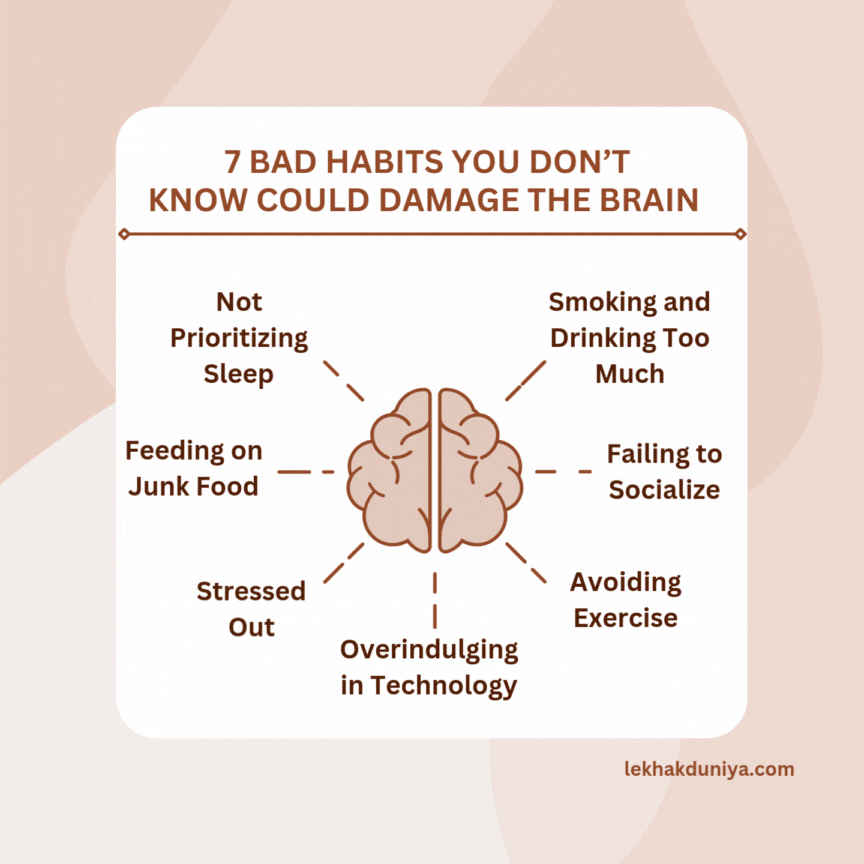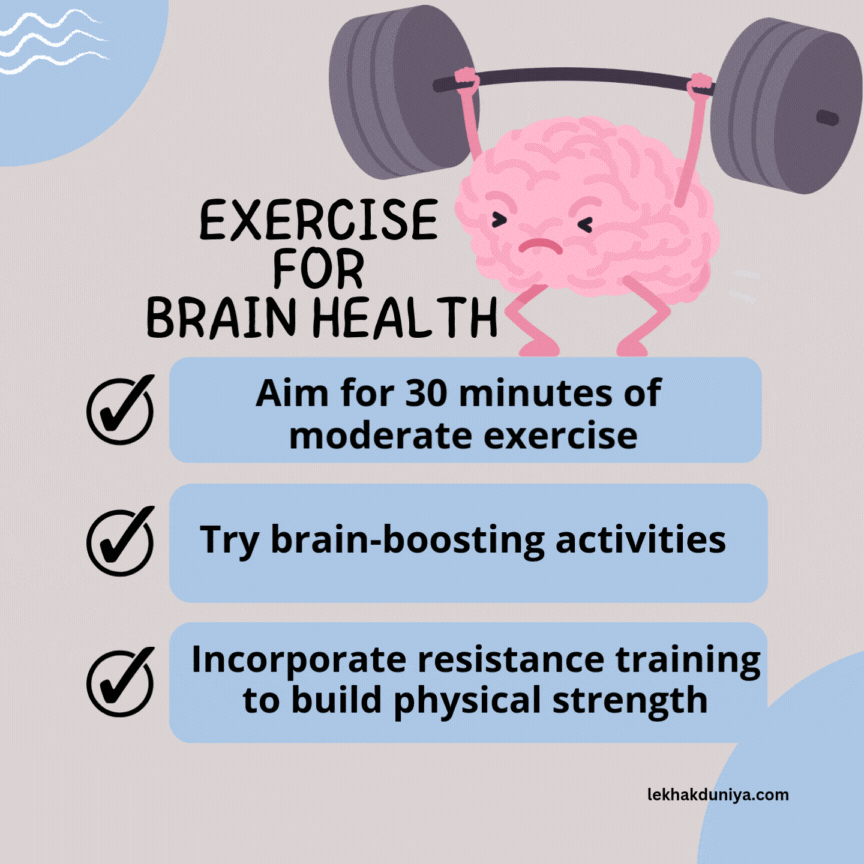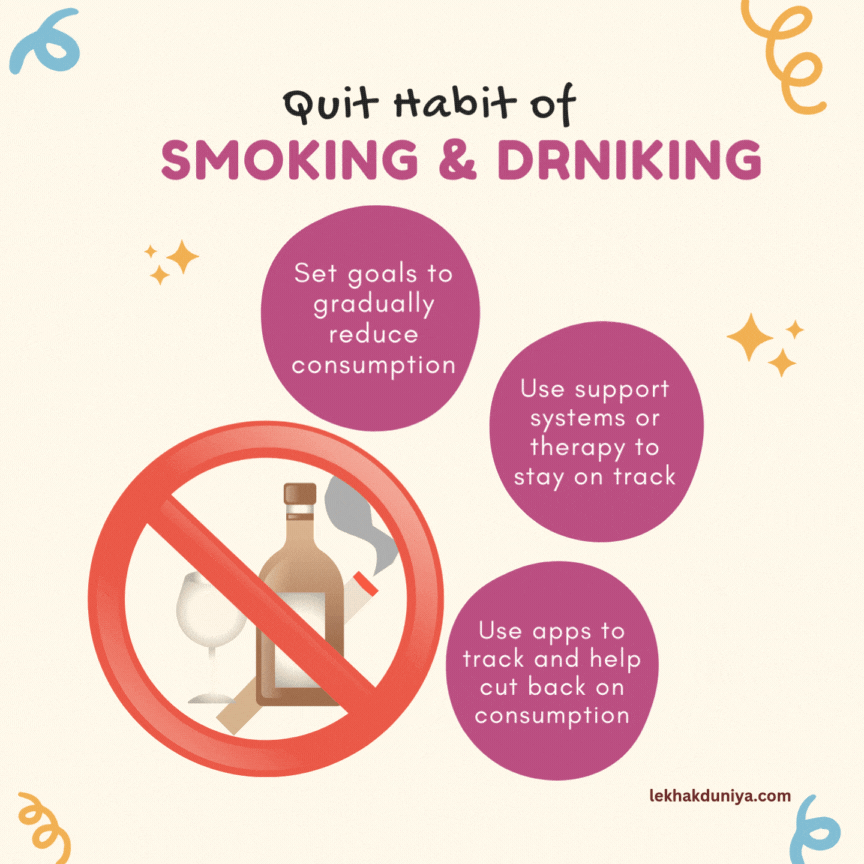The Brain, Your Most Precious Asset
Your brain is your most important organ, responsible for every thought, emotion, and decision. Yet, most of us unknowingly engage in brain-damaging habits that slowly chip away at our cognitive health. You don’t need a traumatic injury or a serious illness to hurt your brain—everyday behaviors can have devastating effects if left unchecked.

In this post, we’ll look at the most common brain-damaging habits and offer practical tips to stop them before they lead to lasting harm. Whether it’s poor sleep or stress overload, these habits can destroy your brain’s health, but the good news is you can reverse the damage with small, simple changes.
Table of Contents
1. Not Prioritizing Sleep
One of the most common brain-damaging habits is not getting enough sleep. When you deprive your brain of rest, it struggles to function fully. Sleep is crucial for consolidating memories, processing information, and clearing toxins from the brain. Skipping sleep can lead to long-term damage, including impaired cognitive abilities, difficulty focusing, and mood disturbances.
Over time, chronic sleep deprivation can increase your risk of brain disorders like Alzheimer’s disease and dementia. So, it’s essential to prioritize quality sleep.

Quick Tips to Improve Sleep:
- Create a consistent sleep schedule.
- Avoid screen time and heavy meals before bed to improve sleep quality.
- Create a calming bedtime routine (e.g., reading, dimming the lights) to help your brain wind down.
These small changes can help you avoid the long-term effects of these brain-damaging habits.
2. Feeding on Junk Food
A poor diet isn’t just bad for your waistline—it’s also one of the major brain-damaging habits that can affect cognitive function. Foods high in sugar, unhealthy fats, and processed ingredients can cause brain inflammation, leading to memory and focus issues. Regular consumption of junk food can also affect your mood and increase your risk of mental health disorders like anxiety and depression.
A diet lacking in nutrients deprives your brain of essential components like omega-3 fatty acids, vitamins, and antioxidants necessary to protect brain cells.

Healthier Alternatives:
- Switch to brain-friendly foods like salmon, walnuts, and leafy greens.
- Cut back on sugary snacks and processed foods in your diet.
- Hydrate well to keep your brain functioning at its best.
These dietary changes will boost your overall health and combat one of the most destructive brain-damaging habits.
3. Constantly Stressed Out
Stress is unavoidable, but chronic stress is one of the most harmful brain-damaging habits out there. When you’re constantly stressed, your body releases excess cortisol, a hormone that, in high amounts, can damage brain cells. This can impair your ability to learn, remember, and make decisions. Prolonged stress also shrinks the hippocampus, which is the area of the brain responsible for memory.
Chronic stress isn’t just a mental burden—it physically alters your brain structure and function, contributing to mood disorders like depression and anxiety.

Quick Stress-Relief Techniques:
- Practice mindfulness or meditation for just 10 minutes a day.
- Exercise regularly, as it helps lower cortisol levels.
- Take breaks throughout the day to recharge your mind.
Reducing stress will improve your mood and protect your brain from one of the most common brain-damaging habits we all face.
4. Overindulging in Technology
In our digital age, it’s easy to spend hours on your phone or binge-watching TV shows, but too much screen time is another subtle yet harmful brain-damaging habit. Overexposure to technology reduces your ability to focus, shortens your attention span, and weakens your memory. Excessive use of devices has been linked to changes in brain structure, particularly in areas related to empathy, decision-making, and impulse control.
Constant multitasking across screens can lead to digital burnout, making it harder for your brain to stay sharp and creative.

Tips for Mindful Technology Use:
- Set daily limits on screen time, especially in the evening.
- Take frequent breaks from technology by going for a walk or practicing mindfulness.
- Engage in non-digital activities like reading or journaling to give your brain a break.
Breaking free from this brain-damaging habit can help restore your brain’s ability to focus and think deeply.
5. Avoiding Exercise
A sedentary lifestyle is one of the most underestimated brain-damaging habits. The phrase “use it or lose it” applies to your brain just as much as your muscles. Physical exercise increases blood flow to the brain, promoting the growth of new brain cells and improving cognitive function. On the flip side, a lack of exercise can lead to poor memory, slower thinking, and a higher risk of cognitive decline.
Exercise also helps to reduce stress, boost mood, and improve sleep—all of which are essential for maintaining brain health.

Simple Exercises for Brain Health:
- Incorporate at least 30 minutes of exercise into your daily routine, whether it’s walking, cycling, or yoga.
- Try brain-boosting activities like dancing or swimming to combine physical activity with mental stimulation.
- Even short, frequent workouts can help protect your brain from damage.
Making time for movement is key to reversing this often-overlooked brain-damaging habit.
6. Failing to Socialize
Humans are social creatures, and isolation is another of the sneaky brain-damaging habits that can harm cognitive health. When you isolate yourself, your brain is deprived of essential social interactions that stimulate critical thinking, emotional regulation, and problem-solving. Social isolation has been linked to memory loss, depression, and even a higher risk of developing dementia.
Loneliness creates a vicious cycle that can lead to emotional problems and further reduce your brain’s ability to function at its best.

Ways to Socialize, Even When Busy:
- Plan regular get-togethers with friends and family, even if it’s a virtual call.
- Join a local group or hobby club to meet new people.
- Volunteer for a cause that interests you to connect with others while giving back.
Building and maintaining social connections is essential to reversing this dangerous brain-damaging habit.
7. Smoking and Drinking Too Much
Both smoking and excessive alcohol consumption are notorious brain-damaging habits that can have severe long-term consequences. Smoking reduces oxygen supply to the brain, leading to cognitive decline and memory problems. It also increases the risk of stroke and brain damage. Similarly, drinking too much alcohol impairs brain function, leading to memory blackouts, slower reaction times, and impaired judgment.
Long-term smoking and drinking can lead to irreversible brain damage, including conditions like Wernicke-Korsakoff syndrome, a severe memory disorder.

How to Break This Habit:
- Set realistic goals to gradually reduce smoking or alcohol consumption.
- Use apps like “QuitNow” for smoking or “DrinkControl” to track and cut back on alcohol.
- Seek support from friends, family, or support groups to help stay motivated.
Kicking these destructive brain-damaging habits will have immediate and long-lasting benefits for your brain health.
Final Thoughts: Small Changes, Big Results
Your brain is the control center of your entire life, and protecting it should be a top priority. While these brain-damaging habits might seem small or routine, their impact on your cognitive function can be profound over time. The good news is that you can start making changes today to reverse much of the damage. By improving your sleep, reducing stress, eating brain-friendly foods, and getting more exercise, you can significantly boost your brain health.
Keep in mind, that even small steps can lead to big differences. Break free from these brain-damaging habits now, and enjoy a sharper, healthier mind for years to come.
Call to Action: Take the 7-Day Brain Health Challenge
Now that you know how damaging these habits can be, are you ready to make a change? Challenge yourself to break one brain-damaging habit over the next week.

Here’s a simple 7-day guide to get you started:
- Day 1: Plan your week to ensure you get 7-8 hours of sleep each night.
- Day 2: Replace a junk food snack with a brain-healthy one, like nuts or berries.
- Day 3: Take 10 minutes to practice deep breathing or meditate.
- Day 4: Reduce your screen time by 30 minutes.
- Day 5: Go for a 20-minute walk or try a new workout.
- Day 6: Call a friend or family member for a chat.
- Day 7: Take a step toward cutting back on smoking, alcohol, or another unhealthy habit.
So, take the first step—identify which habits are holding you back and commit to changing them. Your brain will thank you!
Share your progress and inspire others by using the hashtag #BrainHealthChallenge!
FAQ’s: Breaking Brain-Damaging Habits
Q1. What are brain-damaging habits?
Ans: Brain-damaging habits are everyday actions that can hurt your brain over time. Things like skipping sleep, eating unhealthy foods, or overusing technology can weaken memory, focus, and overall brain health.
Q2. How does lack of sleep affect brain function?
Ans: When you don’t get enough sleep, your brain misses out on key functions like clearing out toxins and forming memories. Over time, this leads to trouble with focus, and memory issues, and even increases the risk of dementia.
Q3. Can stress harm my brain?
Ans: Absolutely. Chronic stress increases cortisol levels, which can shrink your hippocampus, the part of the brain responsible for memory. Too much stress also affects your mood, focus, and long-term cognitive health.
Q4. How does eating too much sugar hurt the brain?
Ans: High sugar intake causes inflammation in the brain, which can slow down cognitive function and damage memory. It’s also linked to mental health conditions like anxiety and depression.
Q5. Does sitting too much damage your brain?
Ans: Yes, a sedentary lifestyle can lower blood flow to the brain, leading to reduced cognitive performance and increasing the risk of neurodegenerative diseases like Alzheimer’s.
Q6. How do smoking and alcohol affect brain health?
Ans: Smoking reduces oxygen flow to the brain, which damages memory and increases the risk of stroke. Excessive alcohol consumption can lead to long-term brain damage, including memory loss and impaired thinking.
Q7. What are some easy ways to stop these brain-damaging habits?
Ans: Start by making small changes, like setting a regular sleep schedule, eating brain-boosting foods, staying active, managing stress, and cutting back on alcohol or smoking. These steps can improve your brain health over time.




This was beautiful Admin. Thank you for your reflections.
Masalqseen I very delighted to find this internet site on bing, just what I was searching for as well saved to fav
Fantastic site Lots of helpful information here I am sending it to some friends ans additionally sharing in delicious And of course thanks for your effort
Blue Techker This is my first time pay a quick visit at here and i am really happy to read everthing at one place
Thinker Pedia This is really interesting, You’re a very skilled blogger. I’ve joined your feed and look forward to seeking more of your magnificent post. Also, I’ve shared your site in my social networks!
The photographs and visuals used in this blog are always stunning They really add a beautiful touch to the posts